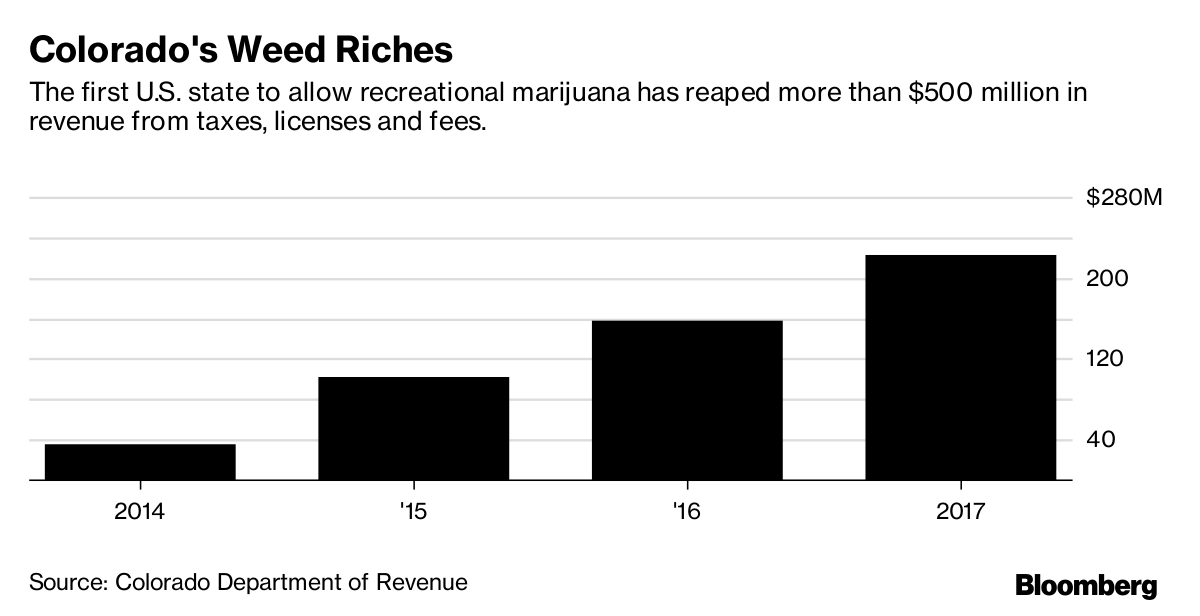New Jersey reaped billions from slot machines and blackjack tables in the decades before casino fever jumped state lines. With Atlantic City’s gambling heyday now past, politicians in the Garden State are aiming to grab marijuana’s riches while neighbors again play catch-up.
Democrat Phil Murphy, with a 25 percentage-point lead in New Jersey’s race for governor, has vowed to legalize recreational pot statewide, and has support from key lawmakers likely to win re-election in November. His Republican challenger, Kim Guadagno, has said she favors decriminalizing the drug, even after serving almost eight years as lieutenant to term-limited Governor Chris Christie, who condemns casual marijuana use and calls its profits “blood money.”
Beyond the political will and public opinion favoring legalization, New Jersey has a financial incentive to beat New York and Pennsylvania for access to a legalized market where North American consumers spent $6.7 billion in 2016. Its pension system is the least-funded among U.S. states, and annual payments are increasing pressure on its budget. New Jersey’s key indicators will trail the nation’s significantly through 2026, with slowing population and job growth, according to a July report by Rutgers University’s Economic Advisory Service.
“It’s the next opportunity for what I see as an employment boom in New Jersey,” said Senator Nick Scutari, a Democrat from Linden whose weed legalization bill had hearings in June, with the understanding that it would be fine-tuned before any voting early next year. Another proposal, by Assemblyman Reed Gusciora, a Democrat from Trenton, would ask voters to permit pot just in Atlantic City.

Pot Push
Marijuana is outlawed federally, and in New Jersey possession is punishable by a $1,000 fine and six months in jail. More than two dozen states, though, including New Jersey, allow consumption for medical purposes, and recreational use is law in Alaska, California, Colorado, Maine, Massachusetts, Nevada, Oregon and Washington. In August, U.S. Senator Cory Booker, a New Jersey Democrat, introduced a bill to legalize the drug nationally, even as President Donald Trump’s administration remains opposed and his Republican Party controls Congress.
The New Jersey Libertarian Party last year issued a statement on April 20 -- international “Weed Day” -- declaring that in legalized states, predictions about higher crime and the spread of more powerful drugs haven’t panned out. State chapter leaders of the National Association for the Advancement of Colored People and the Latino Action Network told lawmakers in Trenton that minority users are disproportionately penalized, with lives derailed by convictions for what often were youthful indiscretions. Legal experts, including a county prosecutor, testified that enforcement funding would be better spent on public safety.
Public Momentum
Sixty-one percent of Americans say weed should be legalized, according to a CBS News poll conducted in April. Two years earlier, 51 percent supported it. In 1979, eight years after then-President Richard Nixon declared illicit drugs to be “public enemy No. 1,” just 27 percent favored.
Murphy, running for governor after serving as U.S. ambassador to Germany and a Goldman Sachs Group Inc. executive in Hong Kong and Frankfurt, told a town hall crowd in Lambertville in February that he was “all in to legalize marijuana” on justice merits alone. The financial boost, he said, was a sweetener.








